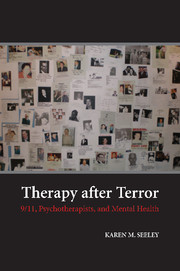Book contents
- Frontmatter
- Contents
- Acknowledgments
- Introduction
- 1 Trauma Histories
- 2 Volunteers for America
- 3 “Get Me Counselors!”
- 4 The Psychological Treatment of Trauma
- 5 The Trauma of Psychological Treatment
- 6 Diagnosing Posttraumatic Stress Disorder
- 7 Trauma as Metaphor
- 8 Mental Health in Traumatic Times
- Notes
- Works Cited
- Index
7 - Trauma as Metaphor
Published online by Cambridge University Press: 05 August 2012
- Frontmatter
- Contents
- Acknowledgments
- Introduction
- 1 Trauma Histories
- 2 Volunteers for America
- 3 “Get Me Counselors!”
- 4 The Psychological Treatment of Trauma
- 5 The Trauma of Psychological Treatment
- 6 Diagnosing Posttraumatic Stress Disorder
- 7 Trauma as Metaphor
- 8 Mental Health in Traumatic Times
- Notes
- Works Cited
- Index
Summary
While the previous chapter looked at the various factors in play for mental health professionals who diagnosed patients after 9/11, additional aspects of diagnosis, and of assigning diagnoses of PTSD, deserve consideration following the World Trade Center attack. This is largely due to the fact that in contrast with almost all other mental illnesses, PTSD is conceptualized as a consequence of exposure to actual catastrophic occurrences, whether they are natural, accidental, or deliberately humanly caused. Every diagnosis of PTSD thus endorses the view that violent social and political events have the power to damage the mind. At the same time, this diagnostic category brings the world at large into clinical consulting rooms. Accordingly, Chapter 7 places conceptions of trauma into wider frames, exploring multiple interactions among the psychiatric, the personal, and the political. By examining trauma's social and cultural dimensions and meanings, the place of politics in therapeutic encounters, governments' management of mood, the formation of psychological citizens, and the national trauma of 9/11, it considers the broader implications of psychological suffering after the attack, as well as the ways that notions of traumatization, and diagnoses of PTSD, were employed to achieve a number of specific political objectives.
THE MEDICALIZATION OF SEPTEMBER 11
As discussed in previous chapters, shortly after September 11, public health officials predicted that the attack would have severe and widespread psychological repercussions.
- Type
- Chapter
- Information
- Therapy after Terror9/11, Psychotherapists, and Mental Health, pp. 147 - 167Publisher: Cambridge University PressPrint publication year: 2008

